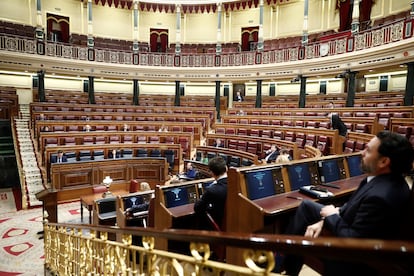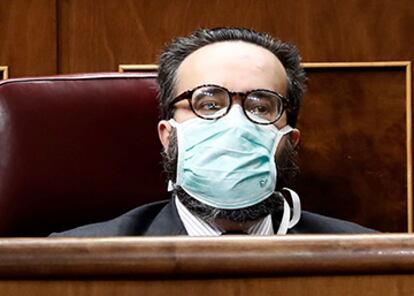Spanish PM to Congress: “The hardest part is yet to come”
Pedro Sánchez addressed a near-empty parliament on Wednesday, to explain the measures the government is taking to combat the coronavirus pandemic

Spanish Prime Minister Pedro Sánchez addressed a near-empty Congress on Wednesday morning to explain the measures that the government was taking to combat the coronavirus pandemic, which has so far left 11,681 people infected and 525 people dead in Spain.
The speaker of Spain’s lower house of parliament, Meritxell Batet, began the session by stating that the absence of the majority of the 350 deputies in Congress was in accordance with the recommendations of the health authorities. She paid tribute to the people who had died so far in the pandemic, to health workers, the security forces and workers who were keeping essential services going, such as supermarket workers and cleaners. “To all of them, many thanks,” she said, to applause in the chamber.
Sometimes we confuse who our enemy is. Ours is a virus, to which we need to respond forcefullyPrime Minister Pedro Sánchez
Addressing the house, the prime minister passed on his condolences to the families of those who had lost loved ones. “Those who have died alone. People who have not been able to see their grandchildren. This is a cruel disease,” he said.

“This virus is affecting us all,” he continued. “It’s an unprecedented challenge. A challenge that has forced us to take exceptional measures. The virus has changed our way of living together. It is reaping human lives and destroying companies. Sometimes we confuse who our enemy is. Ours is a virus, to which we need to respond forcefully.”
The prime minister went on to explain the aim of the state of alarm introduced on Saturday by the Cabinet, and which gives the government greater powers to deal with the crisis. “This is about protecting the most vulnerable, strengthening the health system and protecting the population with hygiene measures and social distancing. Spain has one of the most efficient and solid health systems in the world. The pandemic has spread through more than 150 countries. This is a health, social and economic emergency. It forces us to respond to the circumstances and to value the health system. This is the time for cooperation and solidarity. The time of our public services.”
He also had a warning: “The hardest part is yet to come.”
Sánchez went on to say that the state of alarm had been put in place when it was essential to do so, and that when the emergency situation has passed, the government will put a commission into place to evaluate the public health system in the country and identify the changes that are needed. “That could be the first lesson from this emergency,” he said.
This is the time for cooperation and solidarity. The time of our public servicesPrime Minister Pedro Sánchez
The prime minister also warned about the economic impact of the coronavirus pandemic. “GDP will fall,” he warned. “The year 2020 will not have 12 months, but rather 10 or even nine.” But, he added, “if we manage to maintain employment levels, the recovery will be fast.”
The prime minister explained that the government’s plans were a “social pact” that consisted of “taking care of one another via public [services].” “The government will present a budget for social and economic reconstruction. We want to count on the support of all political forces for its approval. There will be time for opposition, we are at the start of the political term, and we will do this when we have beaten the virus and evaluated the economic and social impact of this emergency. We will present a budget once the health emergency is over.”
Pedro Sánchez’s Socialist Party (PSOE) is the senior partner in a coalition government with the left-wing Unidas Podemos. The two parties, however, do not have a working majority in Congress and rely on other groups to pass legislation. The main opposition Popular Party (PP) this week pledged its support for the government during the coronavirus crisis.
These measures are aimed at maintaining the drive of the economy during this parenthesis and not leaving anyone behindPrime Minister Pedro Sánchez
“I want to send out a message of absolute calm,” Sánchez continued. “The government will guarantee the supply of foodstuffs, electricity, gas and petroleum products.”
The prime minister also announced that the government is considering hiring medical students who are in the final years of their studies, in a bid to help the health system cope with coronavirus infections.
Sánchez also referred to the €200 billion relief package that the government would be implementing to protect families, companies and the self-employed in Spain. “The second decree that we are proposing for approval in this chamber contains economic measures approved yesterday by the Cabinet,“ he said. “They are aimed at maintaining the drive of the economy during this parenthesis and not leaving anyone behind.” Sánchez said that the government would be making a “decided effort. For those who most need it. We are going to protect all of them while this crisis lasts.”
Sánchez concluded his address to Congress with a message to Spaniards, saying: “We are more than 47 million people, we are a community. One that with a number of languages and accents will fight for the same cause: to beat this virus. Together. That is how we will win.”
Opposition response
Popular Party leader Pablo Casado was next to speak in Congress on Wednesday morning, and told Sánchez that “he was not alone in the battle against the pandemic. You can count on the support of the head of the opposition.” Casado added, however, that the time would come when responsibilities for the management of the crisis would have to be examined. “The truth is that there has been a lack of self-criticism and humility on your part,” he said to the prime minister.
Several opposition leaders stressed the need to put people ahead of economic considerations in the coming weeks and months.
Gabriel Rufián, the congressional spokesman for the Catalan Republican Left (ERC), said that the deferred payment scheme for home mortgages contemplated in a newly announced relief package should also be extended to people who are paying rent, as well as to VAT tax payments. Utility bills should be placed on hold as well, he added. “Too many people in too many crises have been abandoned. Let’s not let it happen this time. Twelve years ago, no time was wasted bailing out the banks. I hope no time will be wasted now bailing out the people.”
Rufián also acknowledged the work of a woman wearing a face mask and surgical gloves whose job it was to clean the lectern in between speakers. “If anyone deserves applause today, it’s Valentina,” he tweeted.
Si alguien se merece un aplauso hoy es ella. Valentina. pic.twitter.com/EKOPoB5nrr
— Gabriel Rufián (@gabrielrufian) March 18, 2020
Pablo Echenique, of the leftist group Unidas Podemos – Sánchez’s coalition partner in government – summed up yesterday’s announcement of a €200 billion aid package. “We are waging a war against the coronavirus. In times of war, economies of war. Today, for the first time in a long time, I am proud of my government.”
Íñigo Errejón, a former leader of Podemos who now heads a small party called Más País (More Country), also urged the government to put people ahead of financial considerations. “At this point nobody doubts that this is an unprecedented situation. There is no spending rule that is above the defense of life,” he said. “The spending ceiling and the deficit targets have stopped making sense. The budget stability law should be temporarily suspended.”
Other lawmakers placed the accent on the job market. “The government must approve a labor contingency plan that makes jobs the big priority in this crisis,” said Iván Espinosa de los Monteros, of the far-right Vox. “Employment cannot become just another victim of this crisis.”
English version by Simon Hunter.
Tu suscripción se está usando en otro dispositivo
¿Quieres añadir otro usuario a tu suscripción?
Si continúas leyendo en este dispositivo, no se podrá leer en el otro.
FlechaTu suscripción se está usando en otro dispositivo y solo puedes acceder a EL PAÍS desde un dispositivo a la vez.
Si quieres compartir tu cuenta, cambia tu suscripción a la modalidad Premium, así podrás añadir otro usuario. Cada uno accederá con su propia cuenta de email, lo que os permitirá personalizar vuestra experiencia en EL PAÍS.
¿Tienes una suscripción de empresa? Accede aquí para contratar más cuentas.
En el caso de no saber quién está usando tu cuenta, te recomendamos cambiar tu contraseña aquí.
Si decides continuar compartiendo tu cuenta, este mensaje se mostrará en tu dispositivo y en el de la otra persona que está usando tu cuenta de forma indefinida, afectando a tu experiencia de lectura. Puedes consultar aquí los términos y condiciones de la suscripción digital.








































